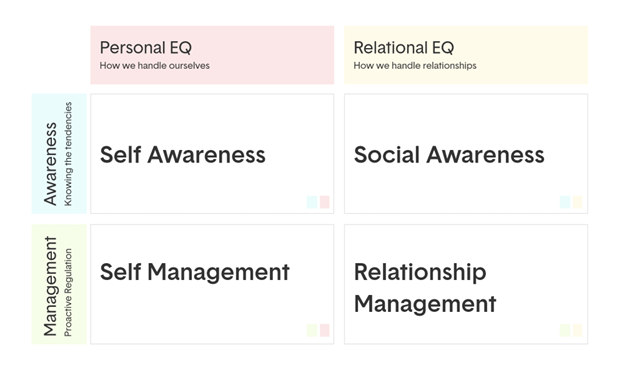You may have a great idea that could make your business more successful and grow easier, but if you can't sell the idea and need for change to your employees, then it won't make a difference.
I've already talked about change management - what it is and how it's used to make improvements for success within a company - but the real goal of any change management plan should be to proactively and effectively lead your people through that change. To do that well, you as a leader need to build for yourself the important people skills known as emotional intelligence.
"When dealing with people, remember that you are not dealing with creatures of logic, but with creatures of emotion." - Dale Carnegie
What is emotional intelligence?
Emotional intelligence (or EQ) can be defined as an understanding and awareness of your own emotions, and an understanding and awareness of the emotions of the folks around you. Being able to recognize that people have different feelings at different times is a key to success.
Have you ever found yourself in a situation where you only have seconds to take the emotional temperature of each individual present, including yourself? And that’s only part of how you evaluate the situation—the next is knowing how to handle or manage it effectively.
To lead happy, productive employees, business owners and managers must develop their own emotional intelligence skills and learn how to teach these skills to employees who wish to succeed too. People who have high EQ are able to manage their emotions and use them for personal growth, better relationships, and greater success. They are also able to understand the feelings of others and respond appropriately to those feelings.
When change management and emotional intelligence collide
Why does this matter when we think and talk about change? As a leader, you want to be someone who even the most change-resistant employees can trust during a hard transition or change. Change management is all about clarity, and when you are able to define what you are feeling as well as the other folks around you in real time as things are happening, you have the opportunity to balance and move through the relational aspect and get to a stable outcome. This does not just happen for most people. It is a skill, and it requires some things to help keep you ready.
Let me walk you through the basics of EQ and how to use these skills to support your people through the change management process.
The 4 parts of emotional intelligence
"If your emotional abilities aren't in hand, if you don't have self-awareness, if you are not able to manage your distressing emotions, if you can't have empathy and have effective relationships, then no matter how smart you are, you are not going to get very far." - Daniel Goleman
Emotional intelligence can be summed up in four parts. Each one plays into how you can better understand the emotional landscape that is happening within your company during a change and respond in a controlled, proactive and positive way.

Self-awareness. The ability to be aware of one’s current emotions and state, as well as the ability to understand the effects those emotions have on others.
Self-management. From basic impulse control to knowing how and when to efficiently respond, self-management is critical for any manager during change management. It also includes being able to take criticism and feedback, allowing a leader to constantly improve their skills in order to keep employees calm, confident and productive throughout the process.
Relationship management. The ability to empathize with others. This is important because it allows a manager to effectively work through difficult situations with employees, especially when sensitive topics arise or emotions are involved.
Social awareness. The ability to recognize the moods of others, maintain a positive attitude and resolve conflicts appropriately is essential for effective leadership and change management. Without social awareness, no leader would be able to identify problems or encourage productivity effectively when confronting challenges. Intentionally shifting your mindset to prioritize your own emotional intelligence will make you a better leader – someone who is not just focused on the results and tasks at hand, but has a pulse on the health of the company’s most important asset – its people.
Getting practical: how you can build your emotional intelligence
There are things you can do and put into action that will help you conquer yourself and what you need while building your EQ abilities.
- Getting rest is one of the first and simplest things you can embrace to get you on your way to being better prepared for the unexpected. I’ll bet that we can all think about a time when we were exhausted, and something required a good, controlled response. And the exact opposite happened. If we think about children—tired equals whining and fussing. We are no different but more educated to use bigger words, more dramatic effects, and nothing short of a semi-controlled emotional meltdown. So make sure you’re getting the rest you need to tackle the things of your day with clarity.
- Pacing yourself in real time is an excellent way to manage and process information along with your input into any situation. Taking a deep breath for a fresh oxygen injection helps your brain and also gives you a minute to gather yourself for what is a helpful contribution to what is happening. There is a reason therapists recommend counting to 10. That takes less time than an emergency response to untangle your unfiltered response.
- Give yourself an emotional temperature check from time to time in your day, especially when the people around you need you to be sharp and engaging. Nothing wrong with a self-check and potential time out if needed. Take that walk and come back in a better frame of mind more in touch with yourself and what is happening around you.
- Know the boundaries between healthy vulnerability and emotional vomiting on the people around you. People care but passing unnecessary pain or fear is not ok. Pull up your bootstraps and put on the happy face as needed. But know where you can park and unload the other things to keep yourself in sync. Being open about your emotions is different than tossing the factoring drivers behind your emotions into other problems that need to be solved. Emotional hand grenades are dangerous in many ways.
- Be present and have a solid read on the people around you when working through challenges and change. Knowing who is engaged and why is helpful versus a bunch of people who aren’t connecting and/or aware of the dynamics that are in the room. If things are off or unclear get on the quickest path to be clear and keep going.
- Clean up your ‘stuff’ along the way. Apologize for your responses and mistakes when needed. This is a key factor for healthy relationship and a principle that will help us to continue making our emotional intelligence stronger and better. It’s all about how you can start and end well whether that be a situation that came up or working through changes as part of a change management plan.
Takeaway: To manage change, leaders need to be aware of their emotional intelligence skills and how they can work with these skills to effectively create and manage change that supports their people.
I like to say “own your stuff and your emotional landscape.” Business managers and owners need to be able to recognize and respond well to their own emotions and the emotions of their employees. And as leaders, we want to be coaching those around us to grow their EQ skills as well. I’d love to spend some time with you and talk about the value of EQ awareness. This should be part of your toolkit while growing your team and creates possibilities as you lead into the future for change to happen.
- Rodney
Additional Resources

Rodney is our Senior Consultant at Koble. Rodney thrives helping people grow and succeed. There is value in people and making interactions matter is what it’s all about. When not behind the Koble desk you may find him serving and building philanthropic efforts and an occasional siting on stage in the eastern and mid-western regions encouraging people to keep learning to keep succeeding. The last three decades provided much experience as a business owner, executive and much non-profit advisory support. Rodney enjoys spending time around home with his family and enjoying the many blessings that the Lord has provided.







